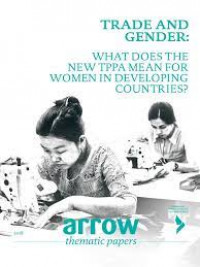
Text
Trade And Gender: What Does The New TPPA Mean For Women In Developing Countries?
The CPTPP, or TPPA-11 as it has been nicknamed, was signed on March 8, 2018 in Chile with the remaining original members of the TPPA bar the US: Australia, Brunei, Canada, Chile, Japan, Malaysia, Mexico, New Zealand, Peru, Singapore, and Vietnam. It will come into force when six of its signatories complete domestic ratification procedures, which could be as soon as the end of 2018. This paper comes at a critical time as more developing countries outside the partnership are looking to join the CPTPP. It aims to analyse the current literature to explore how the CPTPP will likely impact women in the partnerships’ developing country members.
The Comprehensive and Progressive Agreement for TransPacific Partnership (CPTPP) was born from the ashes of the Trans-Pacific Partnership Agreement (TPPA), which fell apart when Donald Trump withdrew the United States from the TPPA on his first day in office. As more developing countries outside the partnership are looking to join the CPTPP, we analyse the current literature and explore how the CPTPP will likely impact women in the partnerships’ developing country members, in terms of the economy, food security, labour, its effect on policy space, the consequences of intellectual property rights, and the environment. Joining us to help us do this is Dhivya Kanagasingam, a researcher from the Asian-Pacific Resource & Research Centre for Women (ARROW).
Availability
| KP II 0851 | 305.5 Kan T | Perpustakaan Komnas Perempuan (Perpustakaan Komnas Perempuan) | Available |
| KP II 0075 | 305.5 Kan T | Perpustakaan Komnas Perempuan (Perpustakaan Komnas Perempuan) | Available |
| KP II 0076 | 305.5 Kan T | Perpustakaan Komnas Perempuan (Perpustakaan Komnas Perempuan) | Available |
Detail Information
- Series Title
-
-
- Call Number
-
305.5 Kan T
- Publisher
- Malaysia : Asian-Pacific Resource & Research Centre for Women (ARROW)., 2018
- Collation
-
26 hlm; 29 cm
- Language
-
English
- ISBN/ISSN
-
978-967-0339-46-7
- Classification
-
305.5
- Content Type
-
-
- Media Type
-
-
- Carrier Type
-
-
- Edition
-
-
- Subject(s)
- Specific Detail Info
-
-
- Statement of Responsibility
-
-
Other version/related
No other version available
File Attachment
Comments
You must be logged in to post a comment
 Computer Science, Information & General Works
Computer Science, Information & General Works  Philosophy & Psychology
Philosophy & Psychology  Religion
Religion  Social Sciences
Social Sciences  Language
Language  Pure Science
Pure Science  Applied Sciences
Applied Sciences  Art & Recreation
Art & Recreation  Literature
Literature  History & Geography
History & Geography